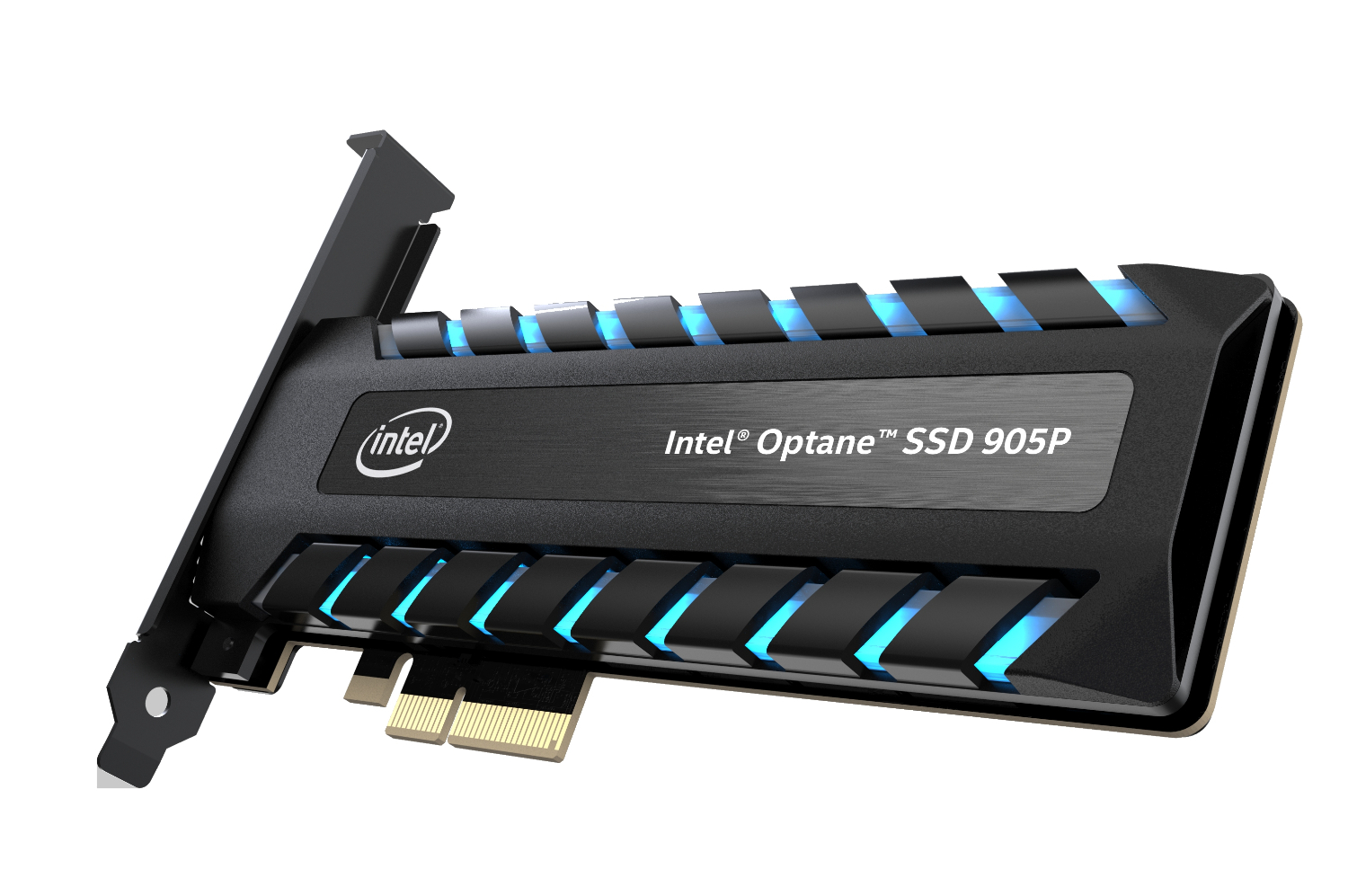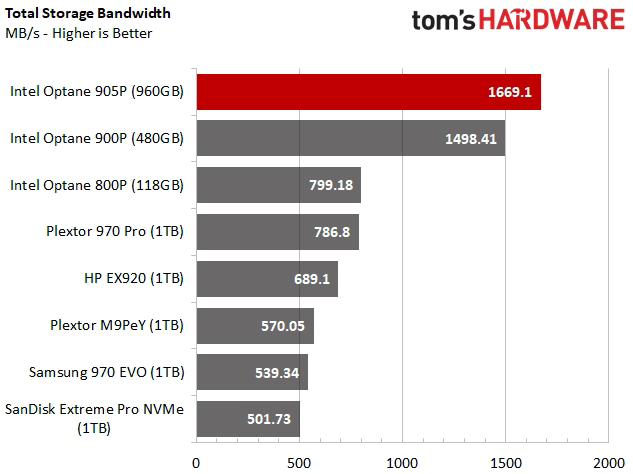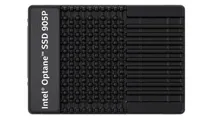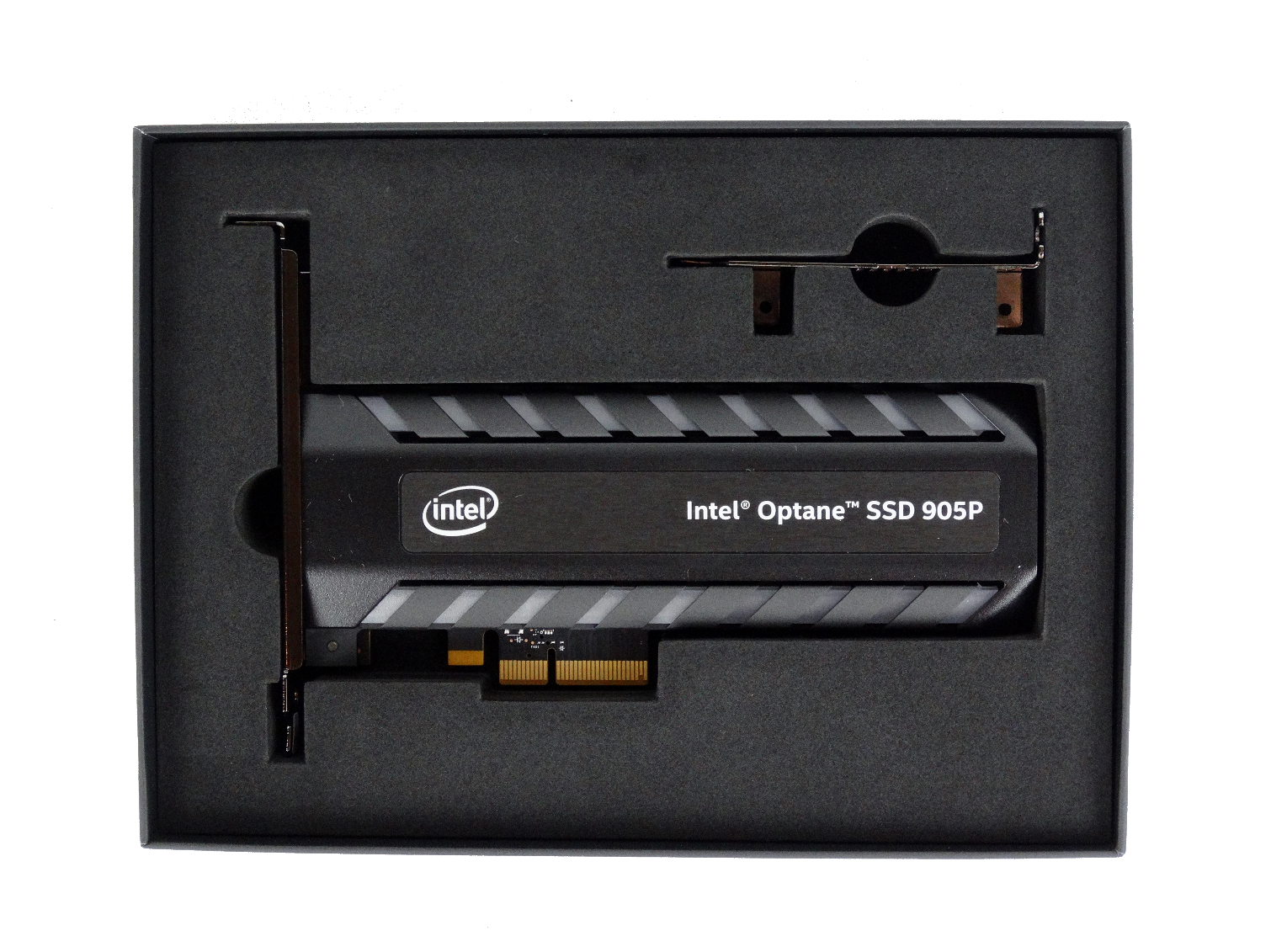Intel's New Optane 905P Is The Fastest SSD Ever
The king is dead. Long live the king. According to our early test results, Intel's just-announced Optane SSD 905P SSD (960GB) is the fastest storage device by a wide margin. The $1,299, 960GB HHHL add-in card dominated other top-performers such as the Samsung 970 EVO (1TB) and Intel's own Optane 900P drive.
For example, when we ran PCMark 8, the Optane 905P was 11 percent faster than its next closest competitor, the Optane 900P (480GB) and more than 300 percent quicker than the Samsung 970 EVO(1TB).
Cost-conscious shoppers can spend $599 to get the 480GB, U.2 version of the 905P, which we have not yet tested. These drives are additions to Intel's 900P series of Optane-powered SSDs so they don't replace siblings like the 900P (480GB).At press time, Newegg had both 905P drives, but the 960GB model was sold out.
The 960GB 905P also has two blue LED strips on the sides that illuminate the inside of your case. Both 905P drives promise up to 2,600 MB/s sequential read and 2,200 MB/s sequential write speeds. Intel claims a random performance of 575,000 IOPS read and 550,000 IOPS write.
Performance Testing
We've only had our 960GB add-in card for a few hours, but we were still able to run some tests. The 905P isn't just the fastest consumer SSD ever released--because it sports higher performance than the P4800X enterprise version with the same 3D XPoint memory technology, this is the fastest SSD ever released for any market.
Intel bills the 905P as a workstation product designed to accelerate extended workloads. It features incredible low queue depth performance but really shines when the CPU wants to chew data at high rates. With hard disk drives and even flash, the CPU will have to wait for data from the storage system. The Optane 905P feeds the processor faster, if you have a project that can actually take advantage of the performance on tap.
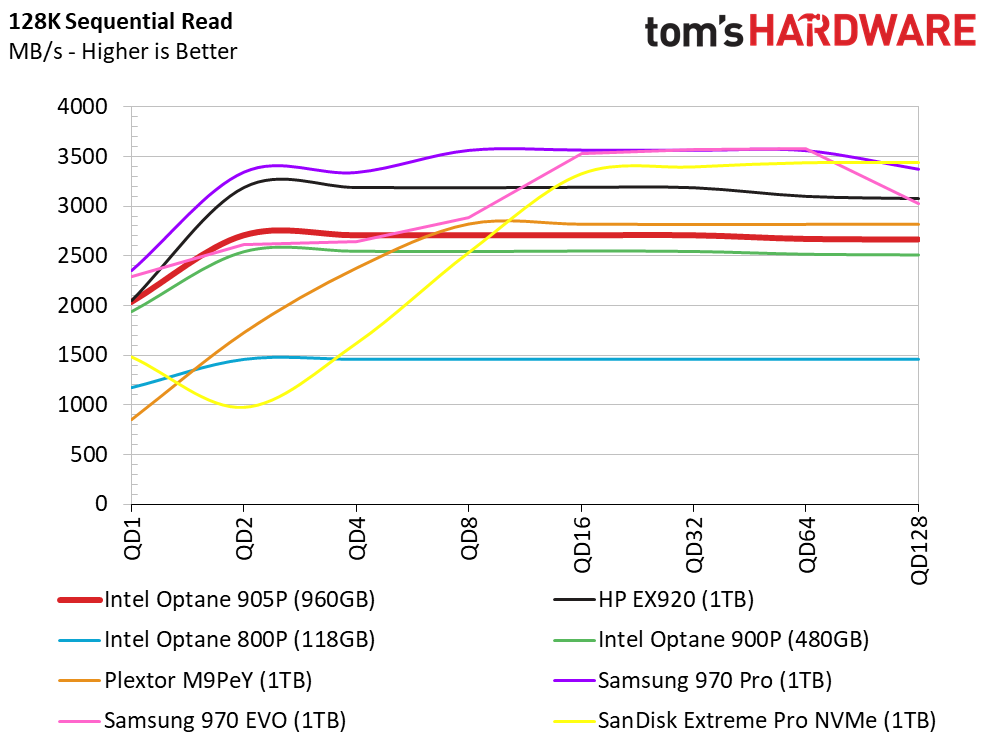
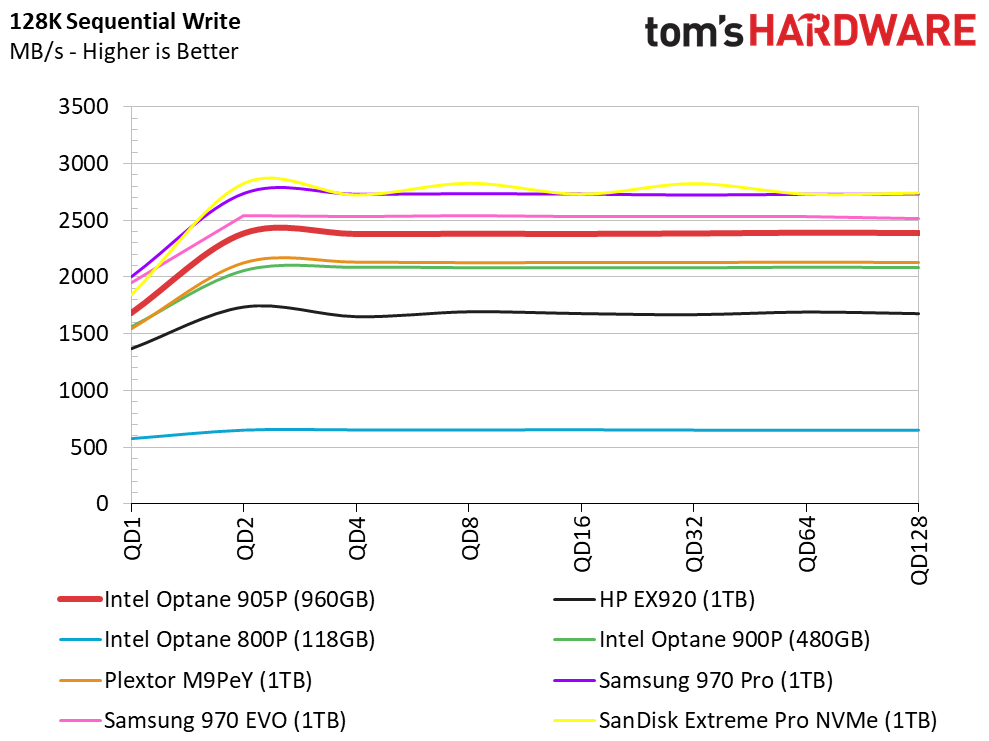
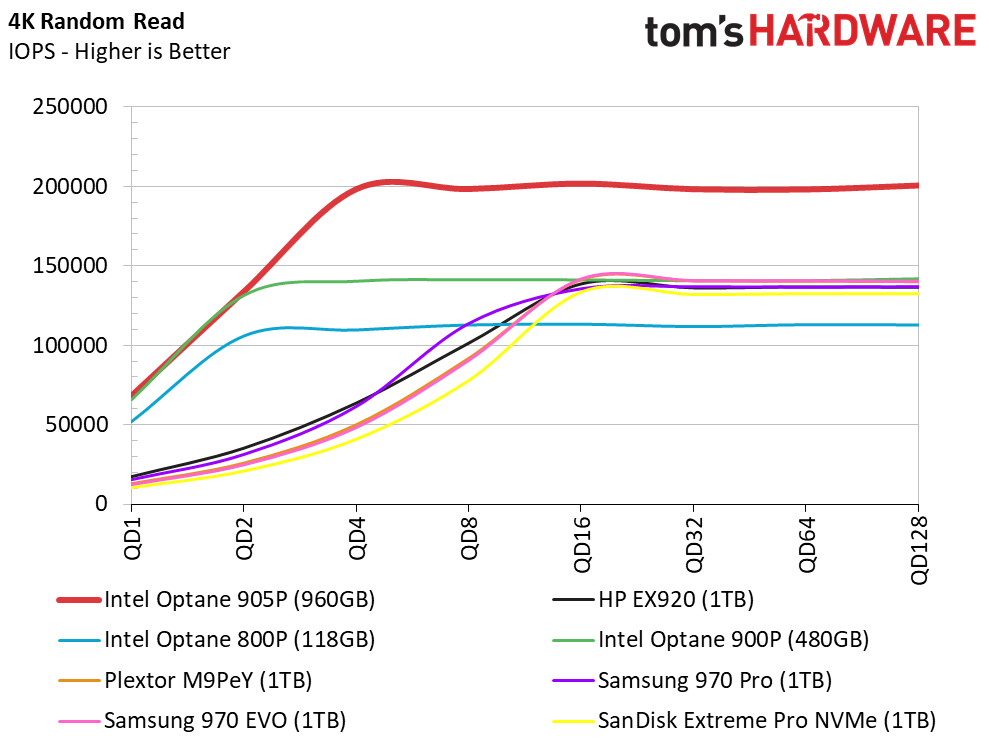
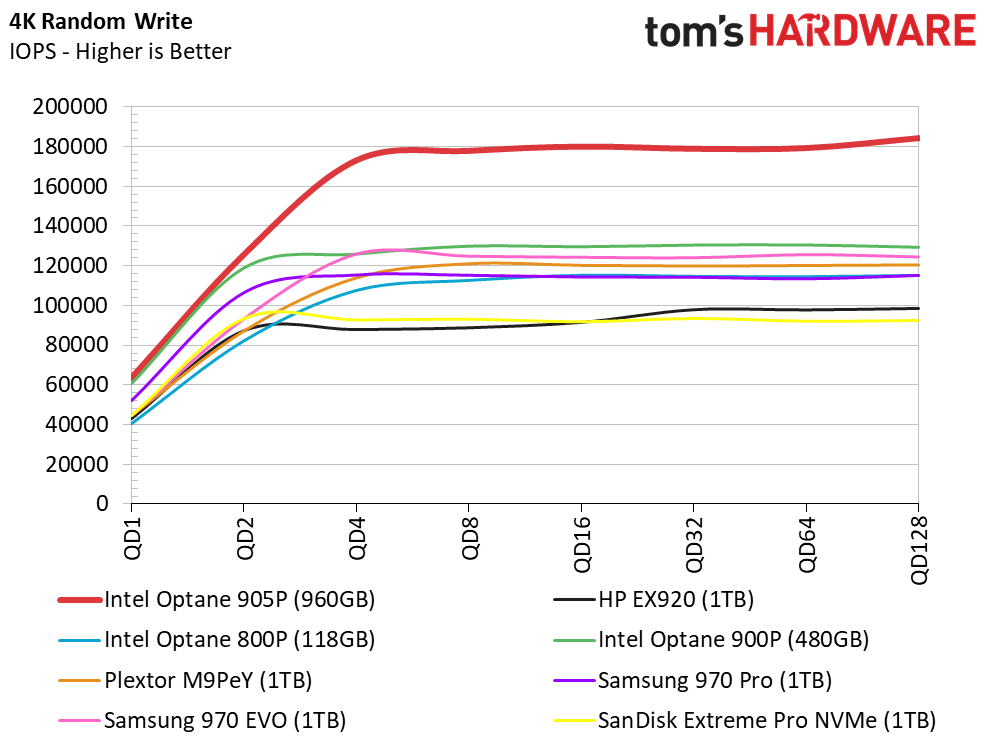
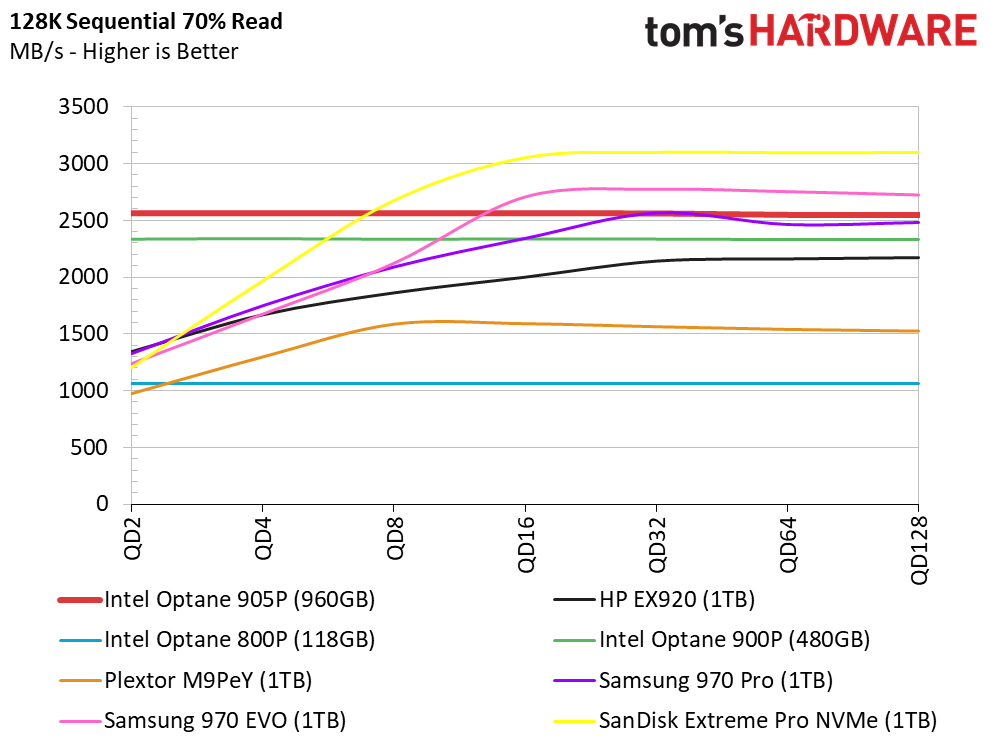
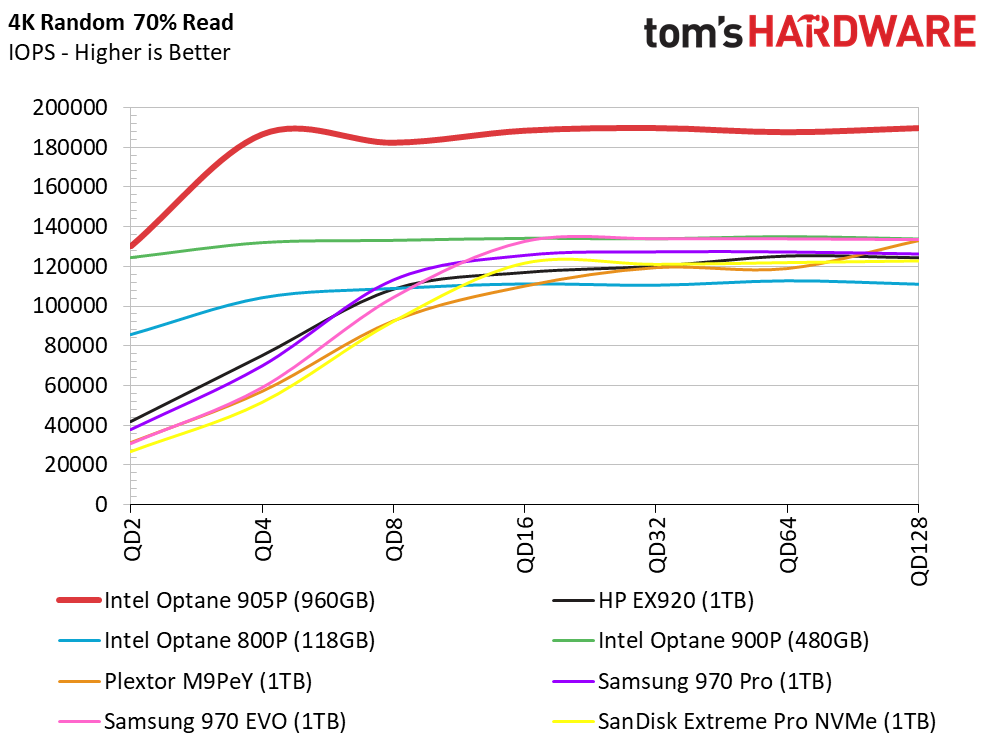
Compared to the Optane SSD 900P 480GB, the new 905P delivers similar queue depth 1 and QD2 random read performance. At QD4 the 905P slams into a new gear that's capable of 200,000 IOPS with a single worker (CPU core). We see a similar increase at QD4 in our random write test when comparing the previous to the new generation Optane SSD.
Get Tom's Hardware's best news and in-depth reviews, straight to your inbox.
The 905P also boosts mixed workloads where the controller and memory must execute complex IO steams with data coming and going at very high speeds. The increased mixed workload performance leads us to believe the 905P will increase application performance over the previous generation. We'll know more in the coming days as we execute some of our own mixed IO with testing and writing the review happening simultaneously.
Look for our full review of the Optane 905P later this week.
Technical Specifications
| Product | 905P | 900P |
|---|---|---|
| Pricing | 960GB AIC - $1,200 (MSRP)480GB 2.5" U.2 - $599 (MSRP) | 480GB AIC - $550280GB AIC - $340280GB 2.5" U.2 - $360 |
| Controller | Intel Custom NVMe | Intel Custom NVMe |
| DRAM | None | None |
| Memory | 3D XPoint | 3D XPoint |
| Sequential Read | 2,600 MB/s | 2,500 MB/s |
| Sequential Write | 2,200 MB/s | 2,000 MB/s |
| Random Read | 575,000 IOPS | 550,000 IOPS |
| Random Write | 550,000 IOPS | 500,000 IOPS |
| Endurance | 10 DWPD | 10 DWPD |
| Warranty | 5-years | 5-years |

Chris Ramseyer was a senior contributing editor for Tom's Hardware. He tested and reviewed consumer storage.
-
WyomingKnott An SSD that is significantly faster than others, but only in random access. Sequential read and write are both exceeded at all depths by the Samsung 970 Pro (Ok, not a consumer device?), in write by the SanDisk and the 970 EVO, in write by the HP EX920. It starts at the top at QD1 for random reads and writes, and smokes the competition at higher QD. Might it be inappropriate for even the high-end consumers?Reply
Of course, a hard drive is perfectly good for most sequential applications, like playing video, but video editors might find this the fastest -
leoscott Considering Newegg has the 970 1tb for 351 (m.2), or 27% of the price of this Optane, 11% performance improvement just doesn't sound that impressive. MEHReply -
Nintendork Editing mostly depends on sequential, so optane doesn't bring that much, for other cases is way faster.Reply
Most prosumer usages don't really benefit from extremely high random performance. -
bit_user Reply
You can always improve sequential performance by taking a given storage device and striping it.20935912 said:An SSD that is significantly faster than others, but only in random access. Sequential read and write are both exceeded at all depths
Random performance (reads, at least) is final. There's not really anything a user can do to improve it. -
bit_user Reply
You're missing the point of this drive. Look at the QD=1 random reads. It's at least as much as that price difference.20936040 said:Considering Newegg has the 970 1tb for 351 (m.2), or 27% of the price of this Optane, 11% performance improvement just doesn't sound that impressive. -
DavidC1 Reply20935912 said:An SSD that is significantly faster than others, but only in random access. Sequential read and write are both exceeded at all depths by the Samsung 970 Pro (Ok, not a consumer device?), in write by the SanDisk and the 970 EVO, in write by the HP EX920. It starts at the top at QD1 for random reads and writes, and smokes the competition at higher QD. Might it be inappropriate for even the high-end consumers?
The NAND SSDs can't maintain their performance when the drive starts to get full, have to rely on TRIM to get rid of the so-called dirty state. Other reviews of Optane said while even high end SSDs like the 960 Pro slows down for a bit after deleting a large file, it doesn't matter with Optane.
If you want the best, this is it. -
bit_user Reply
This is a good point. 3D XPoint is bit-addressable and more resilient than NAND. There's no need for TRIM and there should be no penalty on small writes (i.e. read-mod-write).20936624 said:The NAND SSDs can't maintain their performance when the drive starts to get full, have to rely on TRIM to get rid of the so-called dirty state. Other reviews of Optane said while even high end SSDs like the 960 Pro slows down for a bit after deleting a large file, it doesn't matter with Optane.
I would like to see performance data for random writes < 4k.
